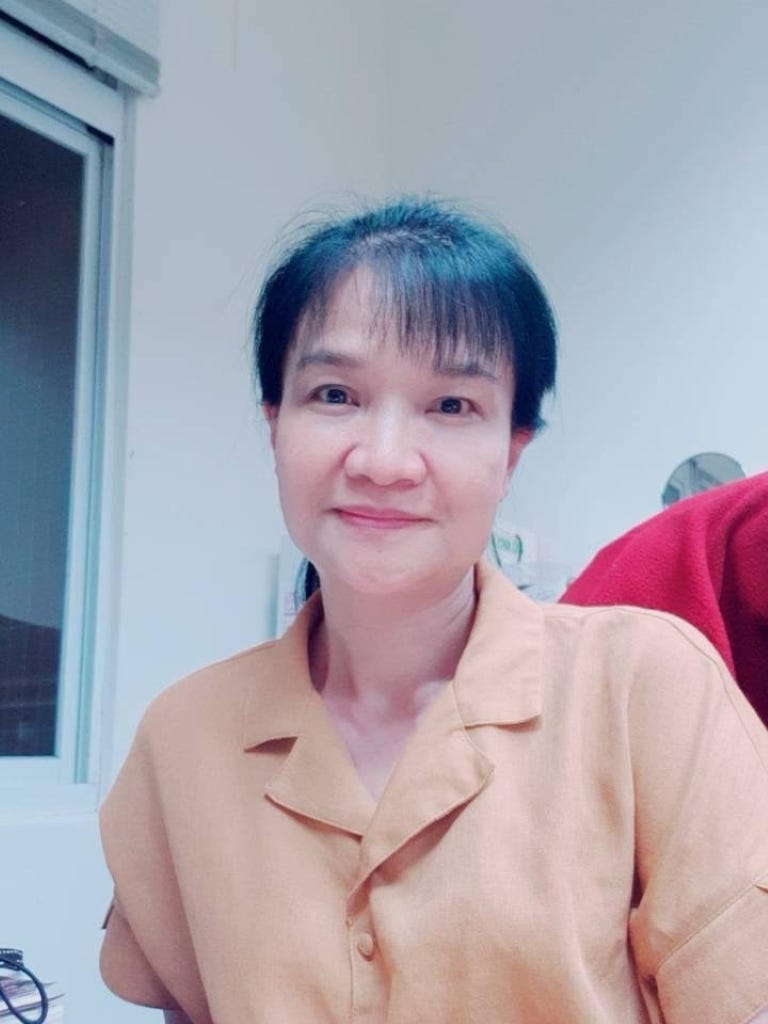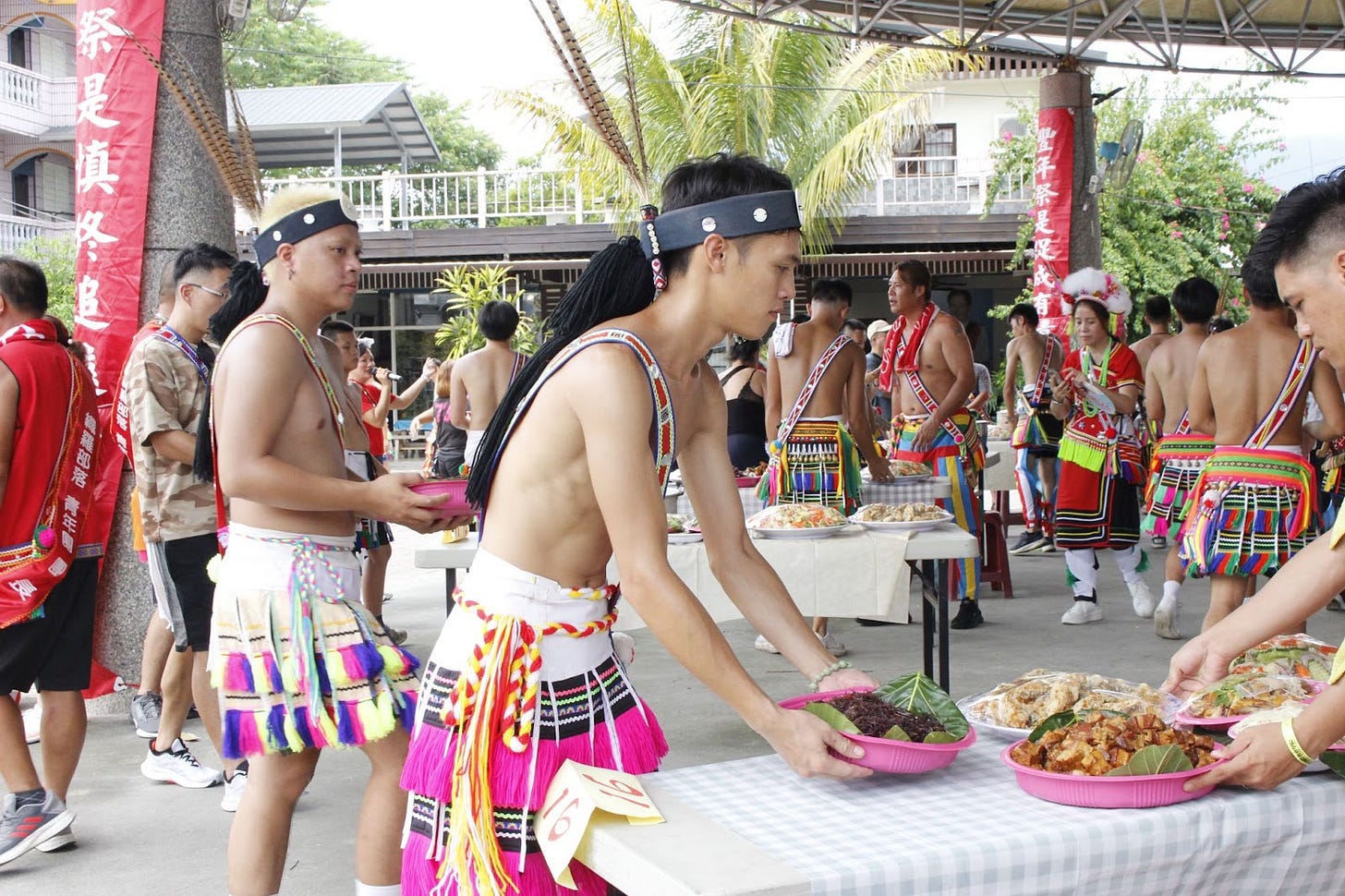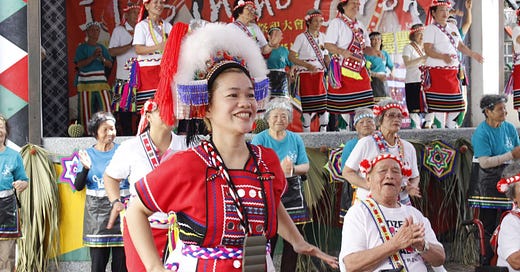The women-led indigenous culture of Taiwan
The Amis have a rare matrilineal kinship system, where inheritance and property pass through women. As part of our series on Taiwan’s resistance to China, we dove into this culture:
Editor’s Note: This is our monthly supplemental issue on Taiwan! We believe that empathy and authoritarianism can’t mix – that when we tell deeply-reported human stories of people threatened by dictators, it compels people to act against injustice.
Agree with us? Upgrade now to support our work.

“I want to recover our female [leadership] tradition. It’s been disappearing for too long,” said the Amis girl, Apuy Anaw.
She had made herself a promise.
The Amis people are one of the largest Taiwanese indigenous groups, with a population of about 224,500. They have been the most well-known matrilineal society in Taiwan for centuries. Taiwan’s indigenous populations are Austronesian in origin, and lived on the main island for thousands of years before Dutch, Spanish, Japanese and Chinese settlers began to colonize.

In Amis societies, women are the heads of the family. After getting married, men move in with the wife’s clan and take the wife’s clan’s name. Women also have different jobs than men, with both genders assigned work according to their age.
For example, women in the younger age groups tend to do things for the family such as farming or knitting; while the older class are mentors and control family property. As for men, the young age class is in charge of hunting or fishing, while the older class maintain public safety, politics and the justice system. Though women dominate the family, Amis culture gives both genders unique jobs in the tribe.
In mainstream Chinese culture, things are very different: male superiority is deeply rooted. Men are generally in charge of families, companies, and the government. Over the years, male supremacy gradually seeped into Amis culture, damaging their unique traditions and shaking female roles in the tribes.
As China seeks to fully assimilate Taiwan – politically and culturally – this issue highlights how external influences can disrupt traditional gender roles, social structures in indigenous communities, and destroy the uniqueness of a particular culture. And in the case of China and Taiwan, this threatens not only the Amis people, but all peoples who have differences with China and may pose a threat to its political system.
The Kuomintang government – once the ruling party of the Republic of China who took charge of Taiwan in 1949 tried to marginalize Amis culture. Now the CCP in China is looking to do the same thing.
Professor Lin Su-Chen, who specializes in indigenous culture at Taiwan’s National Dong Hwa University, explained that it is largely their role in the world of work that makes Amis women so powerful.
Women are considered the economic breadwinners, “because they work at the farm and provide stable meals, making them the leaders of the family,” she said.

The changes in Apuy’s family clearly illustrate how women's roles shifted in Amis culture under the rule of the Kuomintang.
Apuy’s grandmother was a very typical Amis woman. “My grandfather married my grandmother, and he moved into her family,” Apuy recalled. “She was my role model. Her words were everything to the family.”
That changed in the next generation. Apuy’s father didn’t move in with his wife, as had been tradition. Instead, he became the decision-maker in the family.
After Taiwan passed the Household Registration Act in 1946, gender roles in the Amis family structure faced inevitable changes. The new law meant that Amis men started to refuse to take their wife’s name, to avoid discrimination by Chinese men.
In Chinese tradition, family members inherit the father’s last name because they believe males are the ones who should extend the family tree. Men who took their wife’s name could be considered lower class.
The Chiang Kei-Sheck government of the time forced the Chinese naming system on the Amis people. Members of the indigenous group then started to seek more job opportunities in cities dominated by Chinese men, adding pressure on Amis men to adapt to Chinese views.
Apuy’s father believed his children would get a better education in the city, so he decided to send Apuy to a middle school in a northern town, near Taipei. After she finished middle school, Apuy didn’t go back to her tribe. Instead, she finished her bachelor's degree and started working in Taipei, as her father wished. To blend in more easily in the city, she distanced herself from her indigenous identity:
“I left my hometown for 16 years. And at the same time, I abandoned my Amis name that my grandmother gave me.”
After many years of living in Taipei, Apuy ultimately went home: the stress and crowdedness were starting to take their toll.
“My husband and I tried all kinds of medical treatments for two years, but I still couldn’t get pregnant,” said Apuy. “We came from the same tribe. We wanted to see if changing the environment would make a difference.”
It worked. Apuy now has three beautiful kids and they all live together in the Ceroh Tribe, where she and her husband grew up. One of the most well-known and diverse Amis tribes, it’s located on the East of Taiwan.
As Apuy talks about her plans to raise her kids there, she starts to recall how her grandmother used to raise her.
“I used to look at her doing Amis things like farming, selecting vegetables from wild places, or making Amis-style ceramics. But I forgot about them after growing up in the city,” said Apuy with regret. “I wished I had learned her magic.”
Since moving back to her homeland, Apuy has been recovering fragments of memory about her grandmother:
“I started thinking about what I want for my children. They can’t forget how to be Amis like I did. I want to be a real Amis mother.”

During Apuy's absence from the Ceroh community, more and more young people migrated to the cities. But now Apuy and her friends want to make the tribe “young” again, so they have devoted themselves to cultural restoration.
There are 16 indigenous ethnic groups in Taiwan, with a population of around 580,000 people – or 2.5% of the population. However, according to the government, 290,000 have moved to the cities, more than half of the indigenous population.
As well as making the Ceroh Tribe more well-known, Apuy has started classes teaching children traditional Amis culture, such as survival skills. “If you put Amis in a wild place, they won’t die,” Apuy said. The secret is to pick the right plants to eat. Her classes attract not only Amis kids, but also Chinese children too.

This summer, The Counteroffensive had the honor of being invited to the annual Amis Harvest Festival. It’s an important celebration that celebrates the harvesting of crops. The Harvest Festival is considered part of public affairs, which means the men are in charge of running it.

There is a word “Mipaliw” in the Amis language. It means everyone is helping each other.
“As part of the diverse society in Taiwan, Amis is a better example than the Chinese about gender equality,” said Professor Lin. “Because Amis women are more independent. They speak louder than some women from other Indigenous tribes, and even Chinese women.”
NEWS OF THE DAY:
Good morning to readers; Kyiv remains in Ukrainian hands.
US, CANADA EXPRESS SUPPORT FOR TAIWAN: The navies of the United States and Canada have sent a missile destroyer and a frigate through the Taiwan Strait, the U.S. 7th Fleet said.
The U.S. military noted that the passage through the Taiwan Strait reaffirms the commitment of the United States and Canada to support freedom of navigation for all countries. The Chinese side criticized the U.S. and Canadian navies, saying their warships in the Taiwan Strait disrupted stability in this important sea lane.
BEIJING AIDS RUSSIAN ECONOMY: Although Beijing claims it is not helping either side in the war, intelligence suggests otherwise, according to an investigation by Slovo i Dilo. China continues to supply Russia with dual-use goods that can be used for both military and civilian purposes - worth about $300 million a month. In addition, Russia imports about 70% of its machine tools and 90% of its microelectronics from China. About 60% of foreign parts in Russian weapons found on the battlefield came from China.
Want to read our human interest reporting? Show your appreciation by hitting our tip jar.
DPRK SOLDIERS TRIED TO ESCAPE FROM RUSSIAN POSITIONS: The Russians detained 18 North Korean soldiers who tried to escape from their positions in the Kursk region (Russia), according to sources in Ukrainian military intelligence.
The North Koreans taught the Russian military how to use balloons for military purposes. In return, the Russian army taught the North Koreans how to conduct modern infantry combat. After the training, the North Korean military was left in the forest for several days without food or any indication of their plans and intentions. Eventually, some of the North Koreans decided to leave their positions without permission to find the command of the Russian forces.
REFERENDUM IN MOLDOVA: Results suggest that Moldova narrowly supports joining the EU – with a majority of 50.39 percent. Nearly final results from Moldova show pro-European President Maia Sandu winning the first round of Moldova's presidential election. There will be a second round. The election occurred amid allegations by the West and Moldovan authorities that Russia was trying to interfere in the vote. On Saturday, The Counteroffensive published an article about why some people oppose even closer ties with Russia.
Want to read our reporter’s notebook today, as Elaine takes us behind the scenes of the Amis harvest festival? Upgrade to a paid subscription today!
Keep reading with a 7-day free trial
Subscribe to The Counteroffensive with Tim Mak to keep reading this post and get 7 days of free access to the full post archives.






